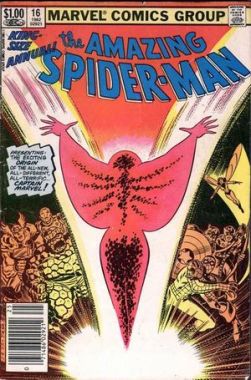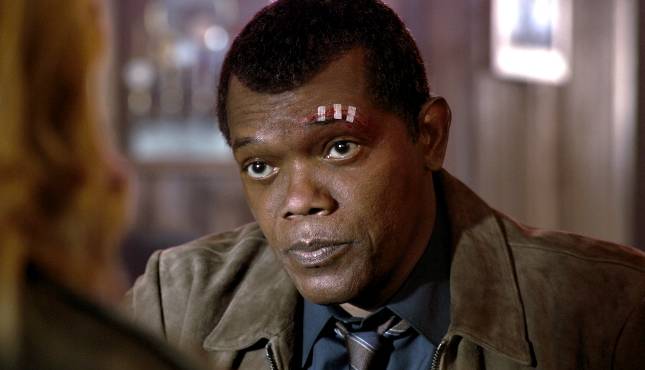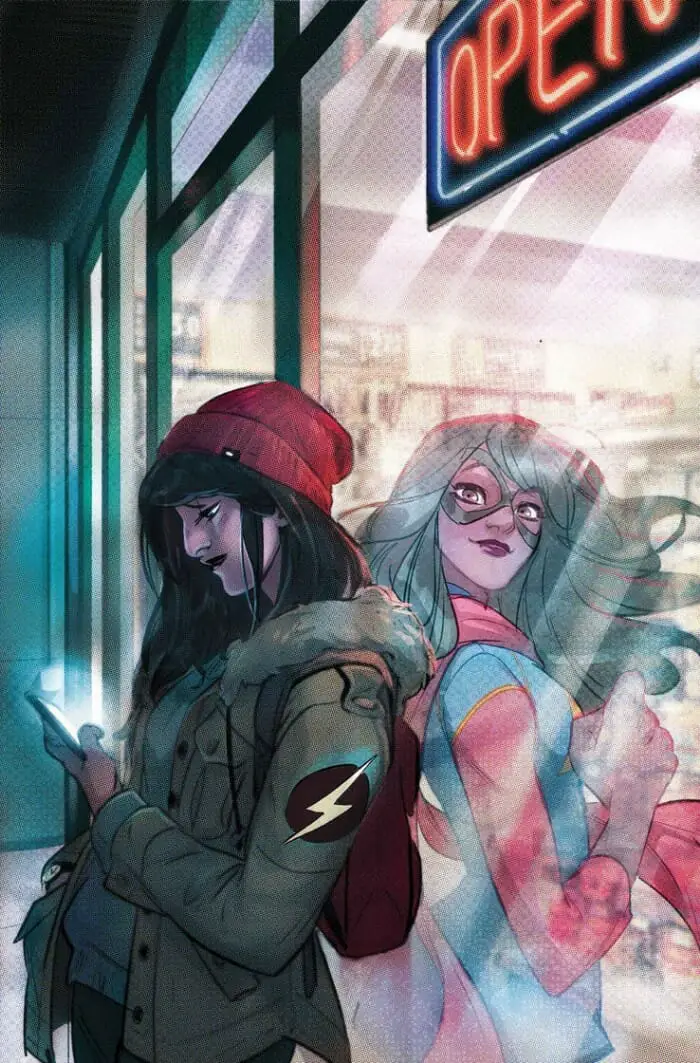*****one minor spoiler***** A shorter version can be found here.

Captain Marvel has been a long time coming. Given the popularity and current box office dominance of superhero movies, as well as the widespread assumption that our society has achieved gender equality, it is sobering to think only one of the 48 Marvel-related films since Bryan Singer’s X-Men in 2000 has had a woman in the lead role (the rather poor Elektra from 2005). Since the official Marvel Cinematic Universe (MCU) started in 2008 with Jon Favreau’s Iron Man there have been no women-led films at all.
If we add to this the latest run of DC films that arguably started with Batman Begins in 2005 we have another 15 films only one of which, Wonder Woman, had a woman in the lead role. Even if we include Catwoman from 2004 that only gives us three films from a total of 65 over the course of 19 years. Interestingly, the fact that Captain Marvel is directed (extremely well, I might add) by Anna Boden also takes the total number of superhero films directed by women up to three. So, contrary to the ravings of one of our radio shock-jocks, this would suggest that “toxic feminism” is certainly not the problem. Rather, it underlines how traditional gender bias that disenfranchises women remains a significant cultural stumbling block.

Although feminist engagement with and activism in this area has a long history, there has recently been a radical (although still not adequate) shift leading to a larger number of women writers, artists and lead characters. Often linked to the issue of “diversity” there has been an important and sustained challenge to the dominance of the straight white man’s worldview, and Captain Marvel, aka Carol Danvers, has acted as a lightning rod for these concerns. The fact that her taking the title in 2012 also resulted in the creation of “The Carol Corps”, a group of dedicated fans and cosplayers (people who create and wear costumes of their favourite characters), speaks volumes about her status and the importance of the challenge currently taking place around this popular cultural form.

That these changes have also been met by regressive and aggressive counter moves under the banner of #comicsgate, a manufactured scandal in which readers who identify as “Alt-right”—the new epithet for a collection of very old far-right chauvinisms—attack creators, editors, publishers and fans who they claim are ruining “their” comics says everything about what is at stake here. When the trailer for the film was first released the majority view of this small but vociferous constituency was along the lines of “Does this bitch ever smile?”, an issue that the film directly and knowingly engages.

So who is Carol Danvers/Captain Marvel? This gets a little complicated, but it does take us into a fascinating piece of superhero history, so bear with me. The first superhero to carry the name Captain Marvel was not published by Marvel at all, but by Fawcett. He first appeared in 1940, but National Periodicals, later to become DC, claimed he was a rip off of their number 1 hero, Superman, and took Fawcett to court. After several years of litigation Fawcett conceded and promised to stop publishing Captain Marvel in 1953, while also paying out $400,000 in damages. In 1972 DC then took out a licence on the name but could only publish under the title “Shazam” (the magical incantation that gave Captain Marvel his powers) because Marvel Comics had cannily jumped in and taken out copyright on the name, quickly introducing their own Captain Marvel in 1967. The Shazammovie that premieres next month is therefore DC’s Captain Marvel movie!
 It was in relation to Marvel’s version that Carol Danvers first appeared in 1968. She was an officer and a pilot in the US Air Force where she met the civilian alias of a Kree warrior called Mar-Vell. He had been assigned to monitor Earth by the alien Kree, but in contravention of his own government’s wishes he became Captain Marvel, Earth’s protector. Carol is severely injured in an accident with Kree technology and her DNA is fused with Mar-Vell’s. In the film this moment of Carol’s transformation is beautifully realised, and through a clever twist to the origin in the comic her “rebirth” plays a very important role in the film’s gender politics.
It was in relation to Marvel’s version that Carol Danvers first appeared in 1968. She was an officer and a pilot in the US Air Force where she met the civilian alias of a Kree warrior called Mar-Vell. He had been assigned to monitor Earth by the alien Kree, but in contravention of his own government’s wishes he became Captain Marvel, Earth’s protector. Carol is severely injured in an accident with Kree technology and her DNA is fused with Mar-Vell’s. In the film this moment of Carol’s transformation is beautifully realised, and through a clever twist to the origin in the comic her “rebirth” plays a very important role in the film’s gender politics.
In the comics, it is not until she returns in 1977 that we find out the accident has given her superpowers in the form of the new hero Ms Marvel. A character shaped by second wave feminism—as suggested by the honorific—she demonstrates incredible feats of strength and courage, while in her civilian role as a woman’s magazine editor she replaces pages of recipes with articles on Kate Millet—famous for her book, Sexual Politics, written seven years earlier—much to the annoyance of J. Jonah Jameson the publication’s proprietor. What the film manages to do extremely well is mirror the struggle Carol faced in 1977 as she wrestled with her dual identity and came to terms with her newfound empowerment.
Like a lot of Marvel’s women characters she suffers a patchy publication history after that, and despite taking on a major role in The Avengers the character is marred by her alcoholism and writers who seemingly didn’t know what to do with her. The low point throughout this time undoubtedly being when she was raped in The Avengers#200 in 1980, an incident that was unacknowledged in the comic and only addressed after complaints from fans, with Carol Strickland’s essay “The Rape of Ms Marvel” being seminal in the movement to address the specific types of violence against women within the genre.

In light of all of this, it was only right that when she was given the chance to become Captain Marvel in 2012 she seized the opportunity in a comic brilliantly written by Kelly Sue DeConnick (who gets her own moment to cameo in the film), with a costume redesign that took her out of her leotard and thigh-length leather boots and put her in a jumpsuit; and while Carol went onto become the “boss of space” her old title of Ms Marvel was passed on to a young Muslim girl called Kamala Khan who became the first Pakistani-American superhero in a comic that captures the best of Marvel’s push for greater representation.
 Carol, however, wasn’t the first woman to carry the Captain Marvel title. That honour went to an African-American woman called Monica Rambeau in 1982, who later went on to lead The Avengers in 1987. She returned the title to the Kree family in 1996 and has since taken on various codenames, but is now known as Spectrum. Here, the film does another superb job in acknowledging this part of the character’s history. Maria Rambeau, Monica’s mother, is written in as Carol’s best friend and Air Force buddy from before the accident. Once Carol begins to rediscover her past we also get to know the young Monica who is confident, intelligent and determined. She’s full of so much attitude that you just know she is going places. Given the time difference between this film, set in 1995, and the current timeframe of the MCU we might even see a grown up Monica in Avengers 4. God, I hope so!
Carol, however, wasn’t the first woman to carry the Captain Marvel title. That honour went to an African-American woman called Monica Rambeau in 1982, who later went on to lead The Avengers in 1987. She returned the title to the Kree family in 1996 and has since taken on various codenames, but is now known as Spectrum. Here, the film does another superb job in acknowledging this part of the character’s history. Maria Rambeau, Monica’s mother, is written in as Carol’s best friend and Air Force buddy from before the accident. Once Carol begins to rediscover her past we also get to know the young Monica who is confident, intelligent and determined. She’s full of so much attitude that you just know she is going places. Given the time difference between this film, set in 1995, and the current timeframe of the MCU we might even see a grown up Monica in Avengers 4. God, I hope so!
Anyway, the film is brilliant. The narrative ebbs and flows through past and present gradually piecing the story together. There is plenty of twists and a whole lot of action, driven by a woman completely unapologetic about the power she has and who gradually discovers how to take it to its maximum. In the trailers, Carol was shown at various ages falling over and getting back up, and the scene in which this is all pulled together is the emotional and political heart of the movie. All her life she’s been told to no go so fast or not to climb so high. As a child and a young woman she always needed to prove she could, but in the end realises she doesn’t and never needed to prove herself to anyone. Captain Marvel in full flow is quite a sight, and Thanos had better watch out because she is going to kick one giant hole in his Malthusian butt.

The signature Marvel humour is there as are the countless little Easter eggs for the comics fans. The film serves as Captain Marvel’s origin story, but it is also the origin story of Nick Fury to some extent, and in a fantastic final scene it rewrites the origin of The Avengers, with Carol Danvers as the first Avenger. A lot of men are going to have a hissy fit about that, but all I can say is “higher, further, faster”. Awesome stuff. I’ve already bought a ticket for tomorrow night and the night after!
On a side note, if you do want to try out the comics, now is a great time. A new Captain Marvelstory, written by the always-excellent Kelly Thompson, is only 2 issues old, and the first issue of a new era for The Magnificent Ms Marvel, written by Saladin Ahmed, is out next week.

| A primer for parents to impress your kids
a. Take a photo of this box with your phone b. Commit to memory c. Casually recount the following on the drive/bus ride to the cinema: 1. The Original Captain Marvel was published in 1940 and was owned (eventually) by DC Comics 2. He was renamed Shazam, so Shazam is another Captain Marvel film 3. Marvel’s Captain Marvel was originally a Kree warrior called Mar-Vell created in 1967. He hung out with Drax, Gamora and Mantis from the GotG films, and he fought Thanos! 4. This Captain Marvel is Carol Danvers who was originally Ms Marvel 5. Ms Marvel is now a young Muslim girl called Kamala Khan, the first Pakistani-American superhero 6. The first woman to be Captain Marvel was actually an African-American woman called Monica Rambeau in 1982. She also became leader of The Avengers in 1987. Monica is in the film, as is her mum, Maria, who is Carol’s bestie! 7. Carol Danvers became Captain Marvel in 2012 |
